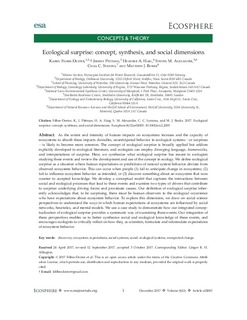| dc.contributor.author | Filbee-Dexter, Karen | |
| dc.contributor.author | Pittman, Jeremy | |
| dc.contributor.author | Haig, Heather A. | |
| dc.contributor.author | Alexander, Steven M. | |
| dc.contributor.author | Symons, Celia C. | |
| dc.contributor.author | Burke, Matthew J. | |
| dc.date.accessioned | 2018-08-02T07:26:25Z | |
| dc.date.available | 2018-08-02T07:26:25Z | |
| dc.date.created | 2018-02-27T15:40:40Z | |
| dc.date.issued | 2017 | |
| dc.identifier.citation | Ecosphere. 2017, 8 (12), 12: e02005. | nb_NO |
| dc.identifier.issn | 2150-8925 | |
| dc.identifier.uri | http://hdl.handle.net/11250/2507219 | |
| dc.description.abstract | As the extent and intensity of human impacts on ecosystems increase and the capacity of ecosystems to absorb these impacts dwindles, unanticipated behavior in ecological systems—or surprises —is likely to become more common. The concept of ecological surprise is broadly applied but seldom explicitly developed in ecological literature, and ecologists can employ diverging language, frameworks, and interpretations of surprise. Here, we synthesize what ecological surprise has meant to ecologists studying these events and review the development and use of the concept in ecology. We define ecological surprise as a situation where human expectations or predictions of natural system behavior deviate from observed ecosystem behavior. This can occur when people (1) fail to anticipate change in ecosystems; (2) fail to influence ecosystem behavior as intended; or (3) discover something about an ecosystem that runs counter to accepted knowledge. We develop a conceptual model that captures the interactions between social and ecological processes that lead to these events and examine two types of drivers that contribute to surprise: underlying driving forces and proximate causes. Our definition of ecological surprise inherently acknowledges that, to be surprising, there must be human observers to the ecological occurrence who have expectations about ecosystem behavior. To explore this dimension, we draw on social science perspectives to understand the ways in which human expectations of ecosystems are influenced by social networks, heuristics, and mental models. We use a case study to demonstrate how our integrated conceptualization of ecological surprise provides a systematic way of examining these events. Our integration of these perspectives enables us to better synthesize social and ecological knowledge of these events, and encourages ecologists to critically reflect on how they, as scientists, formulate and reformulate expectations of ecosystem behavior. | nb_NO |
| dc.language.iso | eng | nb_NO |
| dc.publisher | Ecological Society of America | nb_NO |
| dc.rights | Attribution 3.0 Unported (CC BY 3.0) | * |
| dc.rights.uri | https://creativecommons.org/licenses/by/3.0/ | * |
| dc.title | Ecological surprise: concept, synthesis, and social dimensions | nb_NO |
| dc.type | Journal article | nb_NO |
| dc.type | Peer reviewed | nb_NO |
| dc.description.version | publishedVersion | nb_NO |
| dc.rights.holder | © 2017 Filbee-Dexter et al. | nb_NO |
| dc.source.pagenumber | 12 | nb_NO |
| dc.source.volume | 8 | nb_NO |
| dc.source.journal | Ecosphere | nb_NO |
| dc.source.issue | 12 | nb_NO |
| dc.identifier.doi | 10.1002/ecs2.2005 | |
| dc.identifier.cristin | 1569189 | |
| dc.relation.project | National Science Foundation: DBI-1052875 | nb_NO |
| cristin.unitcode | 7464,20,11,0 | |
| cristin.unitname | Marin biologi | |
| cristin.ispublished | true | |
| cristin.fulltext | original | |
| cristin.qualitycode | 1 | |

